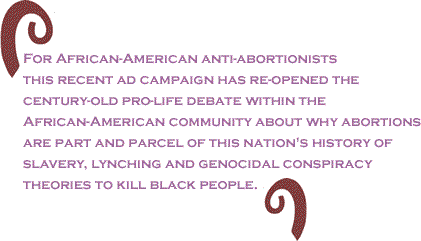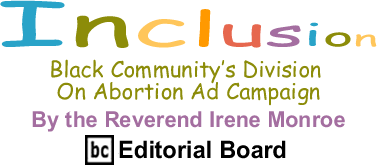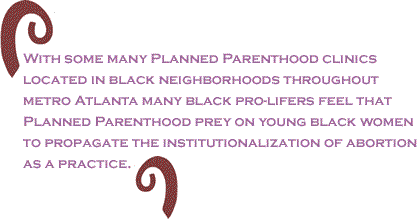
|
||||||||||||||||||||||
|
||||
 |
||||
| Given the history of the exploitation of African American women's reproductive system for involuntary sterilization, medical experimentation, monetary compensation, and political gain, it�s difficulty for many of us in the black community to not see an anti-abortion ad campaign specifically targeting the African-American community in Georgia with a message of �Black Children are an Endangered Species,� as a form of race-baiting. With 80 billboards throughout metro Atlanta, sponsored by a coalition of pro-life organizations, like Georgia Right to Life, The Radiance Foundation, and Operation Outrage, the message they want to convey is resoundingly clear: black women disproportionately undergo abortions. The state's anti-abortion ad campaign comes at a time when data according to the Centers for Disease Control and Prevention (CDC), showed that in 2006 alone, 57.4 percent of the abortions in Georgia were performed on African-American women, although blacks comprise only 30 percent of the state's population. Of the 37 states that reported abortion data by race of that year to the CDC, Georgia was second only to New York City and Texas in the number of abortions performed on black women. The statistics nationwide is equally alarming when African Americans comprise only 13 percent of the nation's population but approximately 40 percent of African- American pregnancies end in induced abortion, compared with 34 percent of non-Hispanic white women and 22 percent of Hispanic women. And according to Mary Mitchell, the Chicago Sun-Times columnist, citing statistics from CDC writes that single black women who are unmarried receive two-thirds of all abortions, ranging in ages between 18 to 24 and have annual incomes of less than $15,000 or have Medicaid. There is no doubt a problem here. However, how the message is spun, and solutions advised will determine the outcome. For African-American anti-abortionists this recent ad campaign has re-opened the century-old pro-life debate within the African-American community about why abortions are part and parcel of this nation's history of slavery, lynching and genocidal conspiracy theories to kill black people.
Haunted by last century�s Tuskegee syphilis experiment that deliberately researched the progression of untreated syphilis on a poor population 399 African Americans without their consent, and haunted by this century�s continued disparities in health care our distrust in the medical establishment is unfounded. And our distrust is with our government as well. Case in point: New Orleans Republican State Rep. John LaBruzzo�s plan to save his state from financial ruin after hurricanes Katrina and Gustav by legalizing the sterilization of poor women, giving sound reasons why these genocidal conspiracy theories are still alive today. In 2008, LaBruzzo feared that Louisiana would be headed towards an economic crisis if the percentage of people dependent on the government were not decreased. His brilliant solution: pay impoverished women $1,000 to have their tubes tied so they will stop having babies they can't afford. �I realized that all these people were in Louisiana's care and what a massive financial responsibility that is to the state,� LaBruzzo told the Times- Picayune. �I said, 'I wonder if it might be a good idea to pay some of these people to get sterilized.'� But for Catherine Davis, an African American woman who has had two abortions herself, and is presently the minority outreach coordinator at the largely white Republican staff of Georgia Right to Life, argues she's merely trying to save black women�s pregnancies from what black pro-lifers call �womb lynching.�
�I realized that African-American women just [don�t] not know the truth, they [do] not understand the truth about the abortion industry,� Davis told the Atlanta-Journal Constitution. That truth according to pro-lifers is that the abortion agenda is tied to ideas and resources of the eugenics movement in America that started in 1926. And Planned Parenthood's founder, Margaret Sanger, an iconic figure for the women�s reproductive rights movement, did not have black women in mind. As a matter-of-fact, Sanger espoused eugenics theory to initiate the �Negro Project� in 1939 that was to be a precursor to what eugenists wanted to implement on a much larger scale. �The main objectives of the [proposed] Population Congress is to�apply a stern and rigid policy of sterilization and segregation to that grade of population whose progeny is already tainted, or whose inheritance is such that objectionable traits may be transmitted to offspring, �Sanger stated at the �Plan for Peace� Senate hearing in 1932.
Long before the passing of Roe v Wade women of all races have used herbal abortives in an attempt to control their fertility in order to have the freedom to dictate their decisions about their reproduction; thus, having the freedom to choose. The high rates of abortions among African- American women in Georgia and elsewhere is a systematic problem that pro-lifers can do something about rather than pointing an accusatory figure at black women who chose to have an abortion. They can help the African-American community curb sexual violence in our relationships, homes and communities, help provide access to services like comprehensive sex education and pregnancy prevention programs, and help provide the availability of contraception. While many black pro-lifers believe that in order to maintain the institution of the black family and to overcome white supremacy is by denying women their right to choose, these same anti-abortionists ironically are also anti-gay, anti-birth control, and anti-condoms, ignoring that homophobic vitriol, STD's and HIV/AIDS will kill the black family sooner than white supremacists anti-black conspiracy theories. BlackCommentator.com Editorial Board member, the Rev. Irene Monroe, is a religion columnist, theologian, and public speaker. She is the Coordinator of the African American Roundtable of the Center for Lesbian and Gay Studies in Religion and Ministry (CLGS) at the Pacific School of Religion. A native of Brooklyn, Rev. Monroe is a graduate from Wellesley College and Union Theological Seminary at Columbia University, and served as a pastor at an African-American church before coming to Harvard Divinity School for her doctorate as a Ford Fellow. She was recently named to MSNBC�s list of 10 Black Women You Should Know. Reverend Monroe is the author of Let Your Light Shine Like a Rainbow Always: Meditations on Bible Prayers for Not-So-Everyday Moments. As an African American feminist theologian, she speaks for a sector of society that is frequently invisible. Her website is irenemonroe.com. Click here to contact the Rev. Monroe. |
||||
 |
||||
If you would like to comment on this article, please do so below. There is a 400 character limit. You do not need a FaceBook account. Your comment will be posted here on BC instantly. Thanks. Entering your email address is not mandatory. You may also choose to enter only your first name and your location.
|
||||
Thank you very much for your readership. |
||||
| Any BlackCommentator.com article may be re-printed so long as it is re-printed in its entirety and full credit given to the author and www.BlackCommentator.com. If the re-print is on the Internet we additionally request a link back to the original piece on our Website. | ||||
| |
||||
March 4, 2010 |
| Executive Editor: Bill Fletcher, Jr. |
| Managing Editor: Nancy Littlefield |
| Publisher: Peter Gamble |
| Est. April 5, 2002 |
| Printer Friendly Version in resizeable plain text format |
 |
 |
 |

|
 |
| |
| |












































